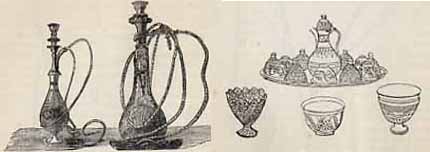
Water Pipes, left; coffee set, right; from Thomson’s “The Land and the Bookâ€
The rustic American style pilgrim’s progress of Rev. William M. Thomson in the 1830s through the 1850s in Palestine was not just about places where the locals swore that Abraham bought a cave or Jesus preached. There were real people along the way and Thomson takes the reader inside a diwan from time to time. In one of his accounts he would be in good company with legislators who ban smoking in public places. Although cigarettes were just taking off in popularity, the traditional approach to tobacco in Syria and Palestine was smoke on the water to be followed by Turkish coffee. Let’s return a century and a half to this precursor of the modern sheesha bar.
I begin to understand your ‘reunions,’ and have been highly entertained by them. I am amused with that ceremonious politeness kept up between these intimate friends. When one enters the room, all rise to their feet, and stand steadfast and straight as a palm-tree to receive him. The formal salaam is given and taken all around the room, with the dignity of a prince and the gravity of a court; and when the new-comer reaches his seat, the ceremony is repeated in precisely the same words. In one of your full divans, therefore, a man gives and receives about fifty salaams before he is fairly settled and at his ease. Then comes the solemnity of coffee and smoking, with a great variety of apparatus. Some use the extemporaneous cigarette, obviously a modern invention. Others have pipes with long stems of cherry or other wood, ornamented with amber mouth-pieces. The ‘argeleh [narghila], however, with its flexible tube of various-coloured leather, seems to be the greatest favourite. Some of these are very elegant. The tube of the one brought to me the other evening was at least sixteen feet long, of bright green leather, corded with silver wire; the bottle, or ‘kuzzaazeh,’ as you call it, was very large, of thick cut glass, inlaid with gold, really rich and beautiful. I, however, could produce no effect upon the water in the bottle. One needs a chest deep as a whale, and powers of suction like another maelstrom, to entice the smoke down the tube, through the water, and along the coiled sinuosities of the snake,or nabridj; and yet I saw a lady make the kuzzazeh bubble like a boiling caldron without any apparent effort. The black coffee, in tiny cup, set in holders of china, brass, or silver filligree, I like well enough, but not this dreadful fumigation. A cloud soon fills the room so dense that we can scarcely see each other, and I am driven to the open court to escape suffocation. Another thing which surprises me is the vehemence of the speakers. When fairly roused, all talk together at the top of their voices, and a great way above anything of the kind I have ever heard. Noticing my surprise, one said to me, ‘You Americans talk as if you were afraid to be heard, and we as if we feared we should not be.’ Indeed, it is an incessant tempest of grating guttorals, which sets one’s teeth on edge; and, in addition, head and shoulders, hands and feet, the whole body in fact, is wrought up into violent action to enforce the orator’s meaning. I wonder how you comprehend a single sentence.
We are used to it; and, unless a stranger calls attention to that which has confounded you, we never notice it. I wish you could have understood the discussions, for they embraced some of those grand and solemn themes which can and ought to stir the deepest fountains of feeling in the human breast. The Arabs delight in such questions.
Excerpt from William M. Thomson, The Land and the Book; or, Biblical Illustrations Drawn from the Manners and Customs, the Scenes and Scenery of the Holy Land. London: T. Nelson and Sons, 1901, pp. 112-115. [Original. 1859]
For The Land and the Book: 1, click here.